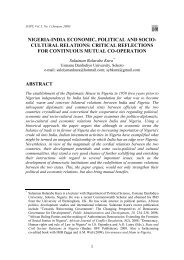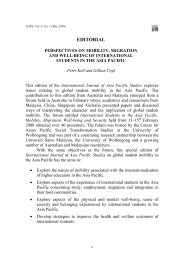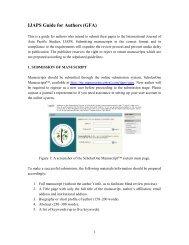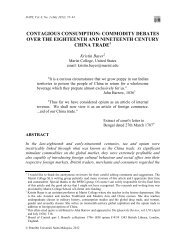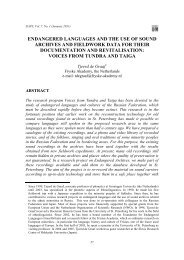colonial office correspondence relating to brunei 'destroyed under
colonial office correspondence relating to brunei 'destroyed under
colonial office correspondence relating to brunei 'destroyed under
You also want an ePaper? Increase the reach of your titles
YUMPU automatically turns print PDFs into web optimized ePapers that Google loves.
IJAPS Vol. 1 2005 (Inaugural Issue)AVM Hor<strong>to</strong>nSUMMARY AND CONCLUSIONIn this paper attention has been drawn <strong>to</strong> documents <strong>'destroyed</strong><strong>under</strong> statute'. The key message is that the registers can yieldvaluable snippets of information and that their use should not beneglected. It was pointed out, first, that much of the material whichhas been lost would have been of great interest <strong>to</strong> his<strong>to</strong>rians. It is auseful lesson in humility. Students of the past rarely get the fulls<strong>to</strong>ry: the process of sifting has already begun long before they seethe evidence and is a handicap <strong>to</strong> obtaining a complete<strong>under</strong>standing of the past. All this raises common-place concernsabout the preservation of his<strong>to</strong>rical materials: who should decidewhat is worth keeping and what is not? At least the registersfurnish us with some idea of what is missing.On a more positive note, secondly, indications are foundabout where <strong>to</strong> look for further information: for example, <strong>to</strong> Lincoln'sInn Library for copies of Brunei's legislation. Guidance is givenabout whereabouts in Hansard parliamentary proceedings <strong>relating</strong><strong>to</strong> the sultanate might be found. The registers also furnish thenames of people who might not otherwise have been suspected ofhaving a Brunei connection (such as Sir Harry Brittain). It is alsopossible <strong>to</strong> follow, for example, the struggle of the Island TradingCompany <strong>to</strong> get shipping space for its cutch exports, which was oneof the sultanate's leading products in the early years of this century.So, thirdly, the indexes yield certain clues which, combined withexisting knowledge, can help of fill in certain lacunae. No doubt thepositive results of all this are often fairly marginal; but in a case likeBrunei, where his<strong>to</strong>rical materials tend <strong>to</strong> be scanty (particularly so,curiously enough, for the first half of the twentieth century) everyand any scrap of information is welcome.With regard <strong>to</strong> the way forward, there is no doubt that otherPRO series of files <strong>relating</strong> <strong>to</strong> Brunei (e.g. CO 717 Federated MalayStates) also include documents "destroyed <strong>under</strong> statute". SimilarlyCO 992/1 (Register of British Borneo <strong>correspondence</strong>, 1942–1946)reveals that several files were either destroyed or suppressed beyondthe usual thirty-year time-span. One would particularly like <strong>to</strong> haveseen CO 531/31/14, sub-file 7, 'Special instructions re Sultan ofBrunei', <strong>relating</strong> <strong>to</strong> the end of the war. It would be valuable,therefore, <strong>to</strong> continue the search beyond the period 1906–1934 forBrunei itself and perhaps <strong>to</strong> extend the approach <strong>to</strong> the his<strong>to</strong>ry ofother countries of South-East Asia as well.38



